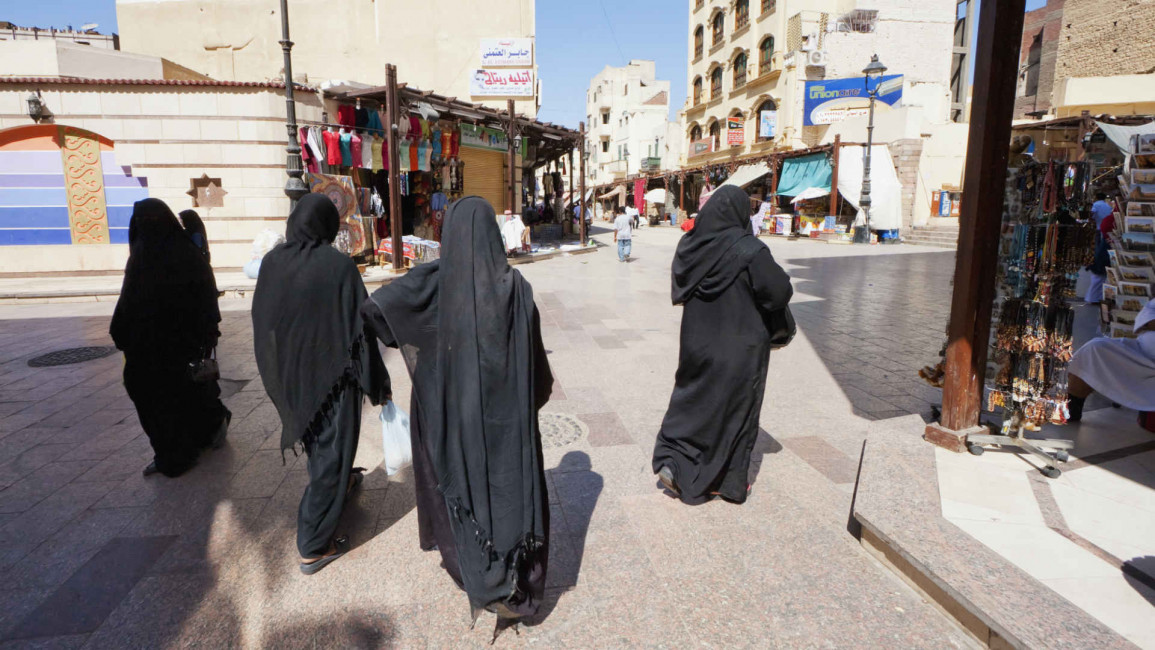
Nubian minorities stand no chance amid Egypt's racist tyranny
The nuances of the ethnicities that comprise the Egyptian population are scarcely understood outside of Egypt, yet they play an important role in understanding aspects of the Sisi regime's ideology and, moreover, the dynamic of some of the political struggles that exist in what's left of modern Egyptian society.
One of the most recent examples was the arrest and detention of 24 Nubian activists, after security forces brutally dispersed a peaceful protest they held in Aswan in September.
The modern roots of this discrimination can be found during the time Egypt was occupied by the British Empire in the late 19th and early 20th centuries, with the construction of the Aswan Low Dam. It was then that the first phase of Nubian displacement occurred, with the clearing of 10 Nubian villages from historical Nubia.
After more adjustments to the dam in 1912 by the British, five more Nubian towns were cleansed.
The most devastating phase of cleansing came in 1964, under the Nasser regime and the construction of his ambitious USSR-funded Aswan High Dam. In total, 44 settlements were cleansed, with most of Nubia submerged under Lake Nasser - all the Nubians have since sought to reclaim is a narrow strip of land on the banks of the Nile in Upper Egypt around the shore of the Lake, with the rest of their land separated by Sudanese border.
Even within Egypt, knowledge of these events is scant. The history of Nubians as an authentically local Egyptian ethnic minority, with their own languages, cultural practices and sense of identity dating back to Pharaonic times, has been stifled.
 |
While many have managed to maintain their ancient cultural traditions, they have been branded 'traitors' to Egypt for doing so |  |
One motivation for restricting Nubians from returning to their lands was an attempt to integrate them into a more "Egyptian" national identity. The reality, however, has been quite different.
Far from any notion of "integration", perhaps well over 300,000 Nubians live across Egypt as an internal diaspora. While many have managed to maintain their ancient cultural traditions, they have been branded "traitors" to Egypt for doing so - every post-1952 Egyptian regime has refused to recognise their languages or provide resources for it to be taught in schools.
Moreover, Nubians are more likely to face economic discrimination, with unemployment levels high and education levels low.
Though this ingrained discrimination and dispossession predates Sisi, the President Field Marshal has not merely maintained chauvinism against Nubians, he has overseen its escalation. Buoyed by the January 25 revolution, an increase in activism among Nubians resulted in them being granted a "right of return" in the Egyptian constitution - but, as with most provisions in that document, Sisi has reneged.
While the protest by Nubians in Aswan in September addressed historic injustices, it also targeted a 2014 presidential decree issued by Sisi that designated 16 of the Nubian areas "military zones" that could not be populated.
Along with this, Sisi announced in 2016 that he would sell off part of the land - originally seized by Mubarak for the ill-fated but now resurrected Toshka project - to internal and external investors, as opposed to allowing Nubians to resettle and cultivate the land. After Nubians protested against this decision, the regime reacted with characteristic authoritarianism, arresting activists and demanding the dissolution and freezing of the assets of the General Nubian Union.
While Nubian activists have remained peaceful, one should look at the Sinai to see how destructive the chauvinism of the Egyptian state has been. It was decades of discrimination against the Sinai's mostly Bedouin Arab population that led to the resentment that finally exploded into a large scale armed insurgency following the 2011 revolution.
Though Salafi-jihadism has been present in the area for years, most of the original insurgents were not affiliated with al-Qaeda or, latterly, the current main fighting force Wilayat Sinai - the local franchise of the Islamic State group.
In the past few decades, and ironically given Nasser's adoption of "pan-Arabism", Bedouins have been denied government employment and the right to own land, effectively being treated as second class citizens. They are also denied jobs in in the relatively recent tourism industry that was built in the Sinai by mostly foreign investment, with employers favouring Egyptian migrants from the Nile Valley.
It was these bubbling resentments and the hopeless situation of many young Bedouin men that allowed a violent black-market economy to spring up in this transcontinental area of land. From this sprang the insurgency and the increasingly deadly rise of IS.
It's in this spirit of xenophobia that the Sisi regime has been able to launch a brutal "counter-insurgency" that most experts say is merely fanning the flames of violence, with vicious methods ranging from extra-judicial executions to airstrikes against civilian areas. These are the contradictions that led to super-rich resorts being uncomfortably close to areas where IS' notorious black banner flies unchallenged.
The Sisi regime was borne of racism and xenophobia. If it wasn't the xenophobic frenzy it whipped up against Syrians and Palestinians to justify itself as a defender of Egypt against the treacherous Muslim Brotherhood, it was its deals with Europe to viciously police the gates of Fortress Europe, in return for lucrative trade deals and diplomatic support.
Forgetting even Sisi's vast human rights abuses against political opponents, Europe was enabling forces that think nothing of shooting unarmed "illegal immigrants", or that preside over a huge deterioration in the living conditions of refugees, forcing them to take the perilous and often fatal journeys across the Mediterranean.
Dead Arabs and Africans washing up on European beaches is an embarrassment for the allegedly liberal EU, which allowed Sisi to gain further favour with Europe by cracking down on human traffickers. This was heavily praised by Europe, but it has been dismissed as a dangerous PR stunt by human rights groups. It has led to a situation where refugees are trapped in Egypt without the right to work, while they face racist harassment, including sexual assault, to which the security forces turn a blind eye.
It didn't have to be like this. While Mohamed Morsi was hardly perfect as a president, the fact he was elected by the people and subject to the checks and balances that come with democracy - however flawed - did make a difference. For example, while for more than three decades Egypt had been turned into a kleptocracy, at first by Sadat's al-Infitah, and then by Mubarak's zealous expansion of it into every area of Egyptian life, Morsi saw things differently.
 |
While counter-revolutionaries ruthlessly attacked Morsi for [land purchase reforms]... it was merely one small step in attempting to break Egypt's praetorian kleptocracy |  |
While he was no economic radical, he introduced a bill that would ban foreign and ex-pat investors from buying up land in places like the Sinai and turning them into resorts for the super-rich and foreign tourists.
While counter-revolutionaries ruthlessly attacked Morsi for this, claiming it would ruin Egypt's economy, it was merely one small step in attempting to break Egypt's praetorian kleptocracy and return some sense of economic power to the Bedouins - the people who reside in the Sinai, and the same people who Sisi would rather bomb and drive into the hands of IS.
With Syrian refugees making up most refugees in Egypt, the anti-Assad Morsi welcomed them, and they flourished, while he famously supported removing Assad and thus the main cause of refugees arriving.
In the same spirit, four months before he was overthrown, Morsi met with a Nubian delegation and vowed to give them "long awaited justice", saying he would pressure the now-defunct elected Shura Council to put Nubian rights on the legislative agenda.
From a progressive perspective, it's perfectly true that the brand of "Islamism" with which Morsi was associated was not without its problems - but it's also true that on questions of racial discrimination associated with "secular nationalism", this form of Islamic-inspired notions, driven by the Islamic ideal of universalism against racism, represented an opportunity to transcend it.
But it was democracy itself that would have been the greatest ally of every Egyptian, regardless of race. If Egyptians who look and sound just like the president and his generals do not even have basic human rights, Egypt's ethnic minorities - never mind refugees unwanted by Europe - stand no chance for equality in Egypt's racist tyranny.
Sam Hamad is an independent Scottish-Egyptian activist and writer.
Opinions expressed in this article remain those of the author and do not necessarily represent those of The New Arab, its editorial board or staff.



